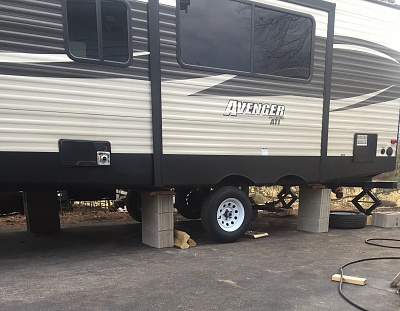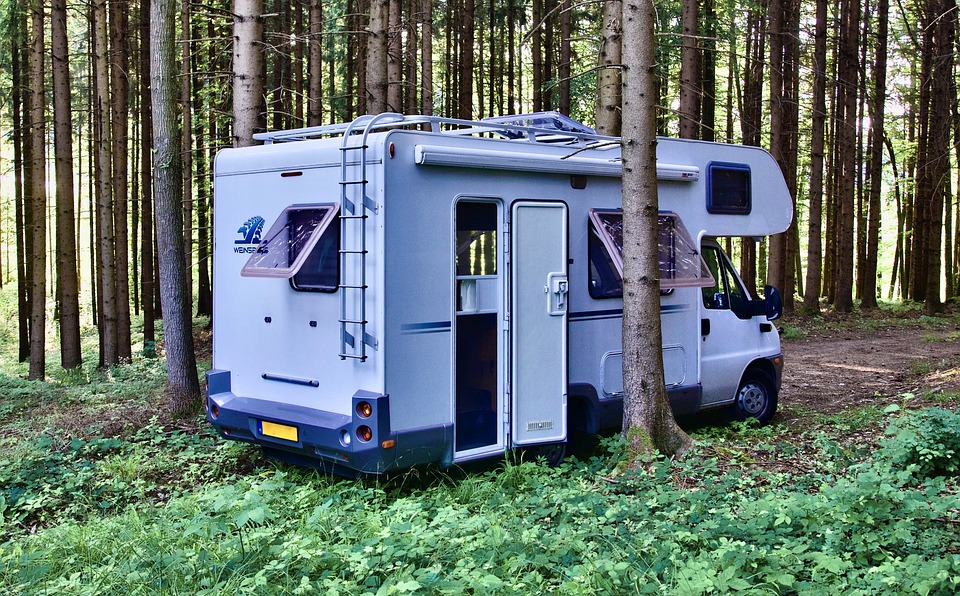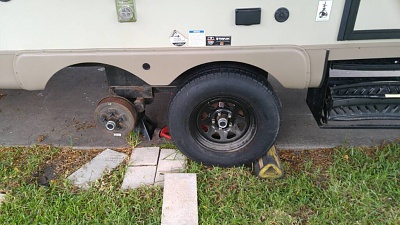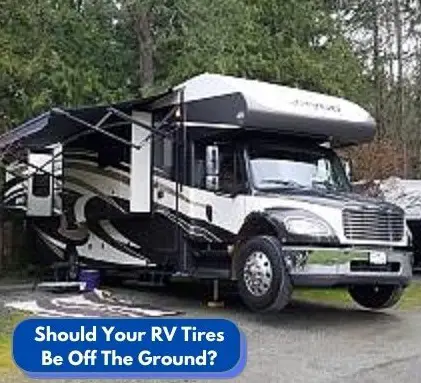We’ve all been there: you travel to your camping destination, excited to get everything set up and start enjoying your trip. Then you pull up to your site and it is extremely uneven, so you set about leveling your travel trailer – but now you’ve got travel trailer wheels off ground and aren’t sure what to do. Should rv tires be off ground?
Your travel trailer wheels should touch the ground after leveling, as leaving them off the ground can create an unstable situation and you also risk flexing or twisting the frame. Use RV tire leveling blocks under your wheels to make sure they’re not suspended in air.
There are different solutions for this as well which we’ll cover in today’s guide.
Travel Trailer Wheels Off Ground After Leveling – What To Use

As we covered already, having your RV tires off the ground can lead to damage to your rig, and we want to avoid that at all costs.
Here are some ways you can remedy the situation.
Use RV Tire Levelers
RV tire levelers (also called RV tire leveling blocks or “legos” by RVers) are an easy way to bring the ground level up to your tires so they’re not suspended in mid-air.
They snap together so you can make different heights for each tire, and some options even have built-in chocks for added convenience.
Use Wood Blocks
A cheap and easy alternative to RV tire leveling blocks is using pieces of 2×4 pressure treated lumber to fix your RV tires off ground.
Cut up a few pieces and keep them in your RV storage where you can easily access them, and add pieces as needed.
We recommend cutting a few different lengths and making sure you have enough blocks to accommodate the width of your tires – some campers put a sheet of plywood over the top to distribute the weight evenly among the wood blocks.
Use Manual Level Instead Of Auto Level
Often times your auto-level system will go overboard and leave your travel trailer wheels off ground.
Using your manual settings gives you control fo the height and often times you can get your RV level (or very close to it) without the wheels coming off the ground.
Support The Leveling Jacks As Well
We’ve talked a lot about the importance of keeping your RV tires in contact with the ground, but you should also consider supporting the leveling jacks, too.
Remember that the further these legs are extended the more susceptible to damage they are, so putting leveling blocks or wood blocks beneath them will save some strain on your system.
Beyond that, blocking underneath the leveling jacks also gives a wider base than the leg itself and better weight distribution, so this is a no-brainer.
Try Heavy Duty Jack Stands
If you really have a strong preference for keeping your camper wheels off ground, you can support your rig with some heavy duty RV jack stands to reduce the amount of work your leveling jacks are doing.
Only use jack stands on concrete, and understand that this is a last resort option and that we always recommend keeping your tires in contact with the ground.
How To Fix Travel Trailer Wheels Off Ground

Assuming you now have leveling blocks, wood blocks, or another way to support your RV’s tires after you level it, we now need to cover how to do that process.
How To Fix RV Tires Off The Ground (Method 1):
- Step 1: You’ve auto-leveled or manually leveled your RV and notice that your tires are off the ground.
- Step 2: Raise the jacks up past the point of level.
- Step 3: Place wood blocks or leveling blocks under the wheels to the desired height.
- Step 4: Lower the leveling jacks until the tires just make contact with the blocks.
- Step 5 (Optional): Place blocks under the leveling jacks to reduce strain on them.
How to Fix 5th Wheel Wheels Off The Ground (Alternate Method):
- Step 1: You’ve auto-leveled or manually leveled your RV and notice that your tires are off the ground.
- Step 2: Measure the amount of space you’ll need under each tire (also note the location of the leveling jacks if you plan on blocking under them).
- Step 3: Retract your leveling jacks.
- Step 4: Back up from your intended parking space and set the blocks in the proper spaces.
- Step 5: Drive up on the blocks and level your motorhome.
Why Should RV Tires Not Be Off The Ground?

There are a few reasons you should try to fix your travel trailer wheels off ground when RVing.
Lack Of Stability
Although your RV’s self-leveling system can support the weight of your trailer, it’s not designed to do so for long periods of time.
The additional weight of occupants and external factors like wind can place extra stress on the leveling systems legs, and this can lead to flexing, warping, or twisting your RV frame.
No Emergency Brake
On gasoline and diesel motorhomes, the emergency brake is on the rear axle.
If the rear tires (or even one of them) is off the ground, you don’t have an emergency brake engaged to keep the RV from moving.
Extra Strain On Your RV Frame
The weight of your travel trailer’s wheels, axles, rims, and suspension components aren’t intended to be “hung” off the frame and fully supported by it, which is exactly what’s happening when you park with 5th wheel wheels off the ground.
This can cause damage to your frame, the aforementioned components, or the mounting hardware.
You Could Pop Your Windshield Out
Although this is more common in older motorhomes, occasionally leaving the travel trailer wheels off ground can place extra stress on the frame causing the windshield to pop out.
Damage To Your Hydraulic Cylinder Shaft
If your RV has a leveling system, keeping RV tires off ground could also lead to your system’s hydraulic cylinder shaft corroding or pitting over long periods of use when extended.
If this happens, the shaft will start leaking and you’ll be looking at a costly and inconvenient repair.
Extra Stress On Your RV Leveling System’s Legs
Your leveling jacks are strongest when they’re retracted and weakest when they’re fully extended.
The more you extend your leveling jacks, the more strain you’re putting on them which can lead to damage.
Should RV Tires Be Off Ground? Wrapping Things Up
We hope this guide helped to explain why keeping your travel trailer wheels on the ground is important and the risks you run by leaving them unsupported.
Are there any other tricks or tips you use when your travel trailer wheels are off the ground to fix the situation?
Let us and your fellow campers know in the comments below.
If you’re into DIY RV repair, check out our other helpful guides:
- How much to expect for an RV roof reseal cost
- Should you use Dawn dish soap in RV black tanks?
- How to fix your RV heater blowing cold air
- How to fix an RV microwave not working
- Our step-by-step guide to motorhome fuel pump replacement
- The best RV flag poles with LED lights & camp locators
- RV window glazing bead replacement
- How to fix an RV toilet not holding water
- How to fix a sagging RV slide out in 5 easy steps
Thanks for reading, and happy camping!

